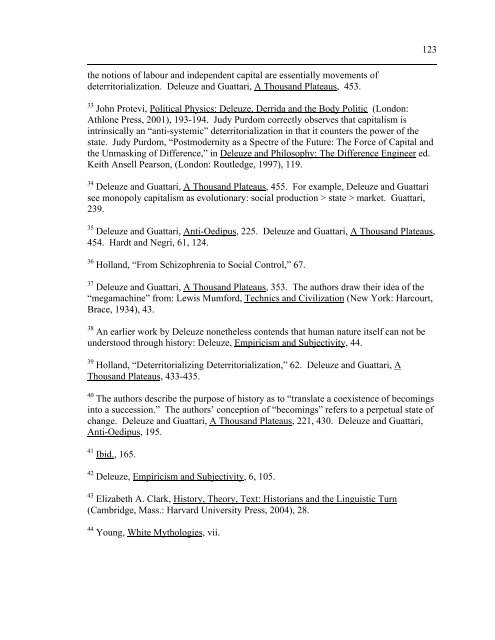A Deterritorialized History: Investigating German Colonialism ...
A Deterritorialized History: Investigating German Colonialism ...
A Deterritorialized History: Investigating German Colonialism ...
You also want an ePaper? Increase the reach of your titles
YUMPU automatically turns print PDFs into web optimized ePapers that Google loves.
the notions of labour and independent capital are essentially movements of<br />
deterritorialization. Deleuze and Guattari, A Thousand Plateaus, 453.<br />
33 John Protevi, Political Physics: Deleuze, Derrida and the Body Politic (London:<br />
Athlone Press, 2001), 193-194. Judy Purdom correctly observes that capitalism is<br />
intrinsically an “anti-systemic” deterritorialization in that it counters the power of the<br />
state. Judy Purdom, “Postmodernity as a Spectre of the Future: The Force of Capital and<br />
the Unmasking of Difference,” in Deleuze and Philosophy: The Difference Engineer ed.<br />
Keith Ansell Pearson, (London: Routledge, 1997), 119.<br />
34 Deleuze and Guattari, A Thousand Plateaus, 455. For example, Deleuze and Guattari<br />
see monopoly capitalism as evolutionary: social production > state > market. Guattari,<br />
239.<br />
35 Deleuze and Guattari, Anti-Oedipus, 225. Deleuze and Guattari, A Thousand Plateaus,<br />
454. Hardt and Negri, 61, 124.<br />
36 Holland, “From Schizophrenia to Social Control,” 67.<br />
37 Deleuze and Guattari, A Thousand Plateaus, 353. The authors draw their idea of the<br />
“megamachine” from: Lewis Mumford, Technics and Civilization (New York: Harcourt,<br />
Brace, 1934), 43.<br />
38 An earlier work by Deleuze nonetheless contends that human nature itself can not be<br />
understood through history: Deleuze, Empiricism and Subjectivity, 44.<br />
39 Holland, “Deterritorializing Deterritorialization,” 62. Deleuze and Guattari, A<br />
Thousand Plateaus, 433-435.<br />
40 The authors describe the purpose of history as to “translate a coexistence of becomings<br />
into a succession.” The authors’ conception of “becomings” refers to a perpetual state of<br />
change. Deleuze and Guattari, A Thousand Plateaus, 221, 430. Deleuze and Guattari,<br />
Anti-Oedipus, 195.<br />
41 Ibid., 165.<br />
42 Deleuze, Empiricism and Subjectivity, 6, 105.<br />
43 Elizabeth A. Clark, <strong>History</strong>, Theory, Text: Historians and the Linguistic Turn<br />
(Cambridge, Mass.: Harvard University Press, 2004), 28.<br />
44 Young, White Mythologies, vii.<br />
123
















